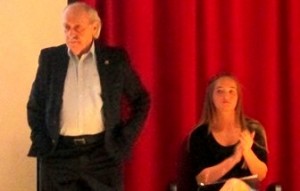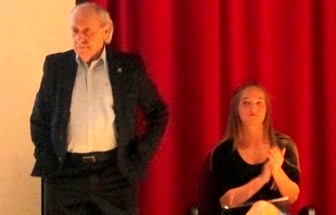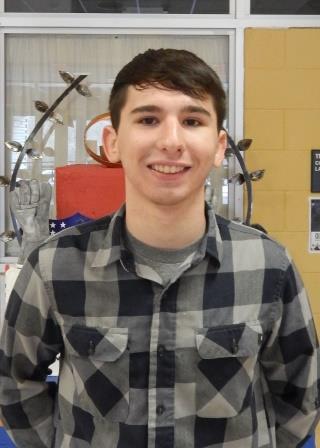Student’s Research Project Leads to Special School Visit from Auschwitz Survivor
By Anna Brower, Staff Writer
The Stampede Newspaper, Clearfield Area Junior-Senior High School
Editor’s Note: Anna Brower is a senior at Clearfield Area Junior-Senior High School, where she is a staff writer for the student newspaper, The Stampede. Contact her at thestampede@clearfield.org.

“I’m sitting here in front of you and I don’t believe it myself; I made it.” David Tuck, a survivor of the Auschwitz concentration camp, shared these words on April 20 with the students and staff of Clearfield Area Junior-Senior High School during two assemblies held at the school.
This special guest was brought to the school by freshman Erica Hanes. For her freshman I-Search project about the Holocaust, Erica’s mother contacted the Holocaust Awareness Museum in Philadelphia to retrieve materials for Erica’s research.
Soon, she was put in contact with Tuck. The student project evolved into a visit to the school, where Tuck shared his own story about surviving Auschwitz and the Holocaust with students in seventh through twelfth grades.
Students are taught about the Holocaust beginning in middle school but sophomore Christen Wisor says, “I didn’t know how bad (the Holocaust was) until he explained his story about going to the camp when he was so young.”
As seniors, students read Night, Elie Wiesel’s account of his time in a concentration camp. Senior Curtis Daub believes that the Holocaust is important to teach to high school students, seniors in particular, because they are getting ready to enter the “real world.”
Erica Hanes thinks that the high school benefited in many ways from the opportunity to hear Tuck speak. She responded, “I personally think that if our students here at CHS listen to Tuck and his story, the level of respect that our students give to people will rise tremendously. I also think that it’s going to encourage students to want to know more about what happened during World War II.”
For Tuck, it was important to visit Clearfield because “people deny it (the Holocaust).” He encourages students saying, “Tell people. Tell them you met someone who lived through it.”
Tuck wants students and adults alike to learn from the Holocaust to prevent it from ever happening again. In his presentation, he continually encouraged students to let bullies be bullies and to not make their problems your problems, saying “if somebody hurts you, walk away.”
It is also especially important to have a visitor like Tuck because he has a past that not many people can say they have, Hanes says. Although Tuck lived through a horrific time period of world history, he does not dwell on it and is “proud to say he made it through the tough times,” according to Hanes. Tuck himself says, “I made it; I will enjoy every day I have.”
Tuck was born in Poland and shortly after his birth his mother passed away. He was raised by his Orthodox Jewish grandparents. On Sept. 1, 1939, things began to change as Germany invaded Poland.
By that winter he and his family were sent to Lodz ghetto and then in 1941, Tuck was sent to Posen labor camp in Poland. Two years later, he was sent to Auschwitz to work as a mechanic.
The camp was liberated by Americans on May 5, 1945 and in 1950, Tuck immigrated to the United States. Tuck began speaking to audiences when his daughter was in high school and he heard that people were denying the Holocaust ever happened.
“I’m happy I’m alive; it is the most important thing,” Tuck said while speaking to Barb Simpson’s advanced German classes at the school.
With all of the terror, both personal and worldwide, raging around us, we should all strive to live like Tuck, as he says, “I never forget… I don’t live with hate; I don’t want to give them the satisfaction.”
To view a live stream video of Tuck’s presentation, go to www.livestream.com/clearfield.




